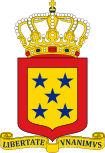| Politics of the Netherlands Antilles |
|---|
 |
| Constitution |
| Executive |
| Legislature |
| Judiciary |
Elections
|
| Related topics |
The politics of the Netherlands Antilles, a former constituent country of the Kingdom of the Netherlands, existed in a framework of a parliamentary representative democratic country, in which the prime minister was the head of government, and of a multi-party system. Executive power was exercised by the government. Federal legislative power was vested in both the government and parliament. The Judiciary was independent of the executive and the legislature. The Netherlands Antilles had full autonomy on most matters. Exceptions were defence, foreign affairs, and the Supreme Court.
Executive power rested with a governor, and a prime minister headed an eight-member Cabinet. The governor was appointed for a six-year term by the monarch, and the prime minister and deputy prime minister were elected by the Staten for four-year terms. The legislature or Staten elected by direct, popular vote to serve four-year terms.
The judicial system, which had mainly been derived from the Dutch system, operated independently of the legislature and the executive. Jurisdiction, including appeal, lied with the Common Court of Justice of the Netherlands Antilles and Aruba and the Supreme Court of Justice in the Netherlands.
The Netherlands Antilles were disbanded on 10 October 2010.
Executive branch
| Office | Name | Party | Since | Until |
|---|---|---|---|---|
| Monarch | Beatrix | 30 April 1980 | 10 October 2010 | |
| Governor | Frits Goedgedrag | 1 July 2002 | 10 October 2010 | |
| Prime Minister | Emily de Jongh-Elhage | PAR | 26 March 2006 | 10 October 2010 |
The Governor was appointed by the monarch for a six-year term.
The Council of Ministers was elected by the Staten.
Legislative branch
Unicameral Estates of the Netherlands Antilles (22 seats; members were elected by popular vote to serve four-year terms)
Political parties and elections
For other political parties, see List of political parties in the Netherlands Antilles. An overview on elections and election results is included in Elections in the Netherlands Antilles.Political parties were indigenous to each island.
Judicial branch
Joint High Court of Justice, judges appointed by the monarch
Administrative divisions
The Antilles were divided into five insular territories: Curaçao, Bonaire, Sint Maarten, Saba, Sint Eustatius. On 10 October 2010 the Netherlands Antilles were disbanded.
Reform
Main article: Dissolution of the Netherlands AntillesInternational organization participation
Caricom (observer), ECLAC (associate), Interpol, IOC, UNESCO (associate), UPU, WMO, WToO (associate)
References
- "End of the road for Dutch Antilles < Dutch news". Expatica The Netherlands. Retrieved 10 October 2010.
| Politics of the Caribbean | |||||
|---|---|---|---|---|---|
| West Indies | |||||
| Caribbean Sea | |||||
| Caribbean continental zone |
| ||||
| Wider groupings may include: |
| ||||
| N.B.: Territories in italics are parts of transregional sovereign states or non-sovereign dependencies.
These three form the SSS islands that with the ABC islands comprise the Dutch Caribbean, of which the BES islands are not direct Kingdom constituents but subsumed with the country of the Netherlands. Physiographically, these continental islands are not part of the volcanic Windward Islands arc, although sometimes grouped with them culturally and politically. Disputed territories administered by Guyana. Disputed territories administered by Colombia. Bermuda is an isolated North Atlantic oceanic island, physiographically not part of the Lucayan Archipelago, Antilles, Caribbean Sea nor North American continental nor South American continental islands. It is grouped with the Northern American region, but occasionally also with the Caribbean region culturally. | |||||
| Politics of North America | |
|---|---|
| Sovereign states | |
| Dependencies and other territories | |
| Politics of South America | |
|---|---|
| Sovereign states | |
| Dependencies and other territories | |